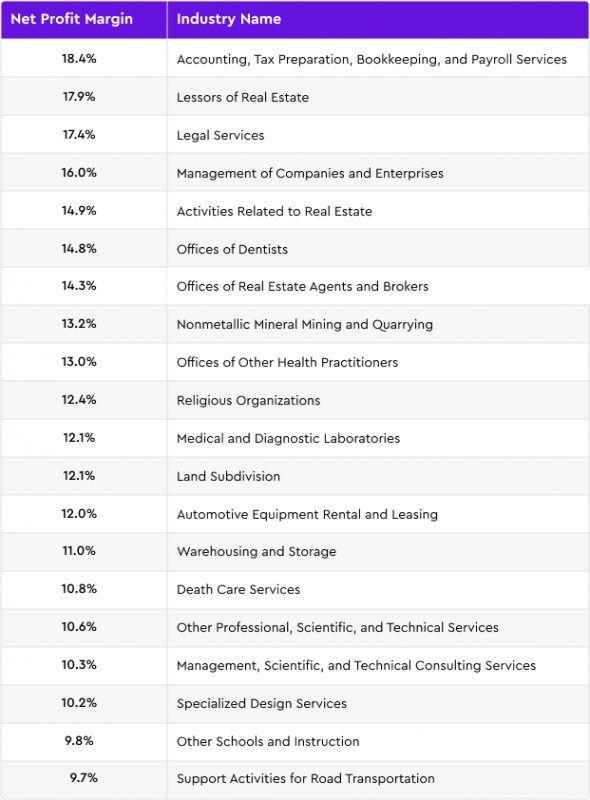
The 8 Most Profitable Small Businesses in 2021
Some people know exactly which small business to start and where their passion lies.
But what if you’re not one of those people? What if, your passion is to have a profitable small business, but you’re stumped for small business ideas? Not to worry, here we’ll help to open your mind to ideas and present you with 8 of the most profitable small business ideas.
What are the most profitable small businesses?
- Accounting/Bookkeeping Services
- Real Estate Leasing
- Restaurant/Dining
- Automotive Equipment Rental
- Warehousing and storage
- Retail (Online)
- Software (System & Application)
- Design Services
To find out why, keep reading…
8 most profitable small business ideas
With the help of data from Sageworks and NYU Stern, we’ll enlighten you on the most profitable small businesses and industries in the US. These industries offer huge potential for those seeking a more stable environment in which to launch their dream enterprise. We’ve picked our top 8 from the two sources.
Full list by NYU Stern:

Full list by Sageworks:

What is a profit margin?
There are different ways to measure a business’s financial health, so what is a profit margin exactly?
Profit margin is defined as the percentage of revenue that exceeds the costs involved in running the business. The average net margins for the S&P 500 in the fourth quarter of 2020, for example, were roughly 8%. That means companies with a net profit margin of over 8% are doing better than average. Below, we list 8 industries that have better-than-average profit margins.
The #S&P500 has an average net profit margin of 9.5%, so if your #business is doing better than that, it means you're in great shape! Click To Tweet
Getting started – Most profitable small businesses
A great small business will always start out as just an idea, but the fact is, some businesses and industries have a much higher profit potential than their counterparts. As an entrepreneur or someone seeking a new independent career path, you may want to focus on one of these ideas.
8 Most profitable small businesses in 2021
1. Accounting/bookkeeping services
Of course, this is number one. As it turns out, accounting, tax preparation, bookkeeping, and payroll services have a 20% profit margin according to NYU Stern and an 18.4% profit margin according to Sageworks! Financial services are needed in every business guaranteeing huge demand no matter the weather. While accounting certifications require a degree, bookkeeping and tax preparation training aren’t too difficult to get your hands on. Once certified, the only overhead costs are space and a computer, making it the perfect business to launch from home. Plus you’ll be near-guaranteed to turn profits as well as heads.
2. Real estate leasing
Real estate leasing is one of the most profitable businesses to be in right about now, with a profit margin of 17.9% according to Sageworks. One report suggests that there are most households renting than at any point in the last 50 years, especially young adults struggling to get on the property ladder. Leasing agents can work from anywhere, no office space needed – just a desk and working computer.
The steps to becoming a real estate lessor (not to be confused with how to become a successful real estate agent) will depend on which state you live in. In some locations, you’ll need a leasing agent license while in other places you’ll need a real estate agent license. From where we’re standing, this looks like a pretty good investment.
3. Restaurant/dining
Hungry for profits? Ever consider monetizing your culinary skills? Net profit margins in the restaurant industry amount to roughly 12.1% (NYU Stern), which paints a promising picture for those who are cut out for the occupation. While there are a fair amount of permits you’ll need to obtain and regulation you’ll need to abide by, there’s no shortage of customers – everybody eats! Plus, new restaurant tech trends are helping to streamline the business so that owners can optimize their profits. If the cost of rent puts you off from the idea, running a food truck is a great way to dodge that expense while simultaneously spreading your name to new locales as you move around.
4. Automotive equipment rental
With net profit margins of 12%, it seems that more and more people are putting a hold on purchasing cars. The automotive equipment rental and leasing industry is projected to continue growing. Most cars are known to depreciate in value and are costly to maintain, plus growing cities and traffic jams are driving more and more people towards renting or leasing. That way they can use public transport or companies such as Uber and Lyft to get from point A to B. With no hard qualifications needed, this is a fairly easy industry to enter!

5. Warehousing and storage
Many businesses deal with ‘things’, lots of things. Whether their inventory is composed of clothes, furniture, equipment, or any other goods – businesses that thrive off of selling products will need storage space, and space is limited. On top of that, homeowners are often looking for space to store their beloved belongings when moving or even need it for their extra things. Whatever the reason, space is a hard thing to come by and has led to a demand for warehouses and storage facilities in both the commercial and residential industries.
With an average profit margin of 11.6%, the great thing about this business is that no education or formal training is necessary. If you’ve got a brain, a touch of bravery, and perhaps a bit of experience in the industry, you’ll be off to a good start! Here’s the catch: constructing, renting or purchasing large amounts of storage space requires a hefty capital investment. Especially those close to big cities.
6. Retail (online)
Online retail, otherwise referred to as eCommerce, is one of the fastest-growing industries nowadays. Over the past 19 years, online retail sales have grown 300%, and nearly 70% of Millennials report a preference for shopping online over in-store. Plus, according to NYU Stern data, the net margins are more than 11%. If current eCommerce trends continue, we can expect those net margins to grow even more and for improved e-commerce business profits.
Concerned over recent headlines reporting a ‘retail apocalypse’? The competition between online retailers and brick-and-mortar stores isn’t over yet!
7. Software (system & application)
We’re living in the digital age, there’s no doubt about it. Every day people are creating more technological innovations that change the way we work, shop, learn, socialize, handle our finances, and much more. In order to be successful in the software industry, you’ll need to invest time in improving your skills on an ongoing basis since programs and techniques are constantly evolving. It’s a bit surprising that the net profit margins for the software industry aren’t much higher – they rank at a little under 10.5%. But, as high tech continues to make its way into more and more industries, the net profits are likely to grow as well.
8. Design services
Calling all creatives minds! Have you got a knack for creativity and don’t want to let your passion go unused? Design services rake in an average of 10.2% in profit margins.
Design services encompasses a number of different focuses, including:
- Graphic design
- Home-interior design
- Landscape design
More often than not, getting started in this industry will require little to no certification or prior training. You’ll simply need big bursts of creativity and the will to succeed. The great thing about this type of business is you could decide to become a graphic designer, for example, and independently freelance your services.
With online services such as Fiverr and Upright, you have a platform to find your clients. Alternatively, you could create a simple website and market your product directly through your own channel.
What to know before starting a small business
First things first, before leaping into your new business journey, no matter what industry or path you choose you’ll need to:
Do your homework
Don’t run before you can walk! Make sure you’re set on your idea and do as much research as you can. Find out what your competitors are doing, find out what the market looks like and how you’ll fit in (or better yet, stand out).
Prepare the paperwork
- Make a solid business plan
- Get an EIN number (also known as a Federal Tax Identification Number)
- Register your business
- Get all the official documentation needed
Get the right financing
Remember, according to a U.S. Bank Study by Jessie Hagan, 82 percent of businesses that fail do so due to cash flow problems, so if you really want to make sure you have a successful business, find something you are passionate making seeking, and make sure you have the funds behind you to get the business started off on the right foot!
According to the Wells Fargo Small Business Index, $10,000 happens to be the average amount that a business needs to get off the ground. If you can’t yet qualify for a business loan or startup loan, you could always look to fund your business with a credit card.
Of course, the type of business will affect the kind of industry loans a business needs, as well as the specific circumstances that business finds itself in. Be sure to weigh your options carefully in order to choose the right funding solution for your business.
What defines a profitable small business?
When it comes to small businesses – those that employ fewer than 500 employees that is – there are those deemed more profitable than others. But what actually defines a profitable small business?
A profitable business is the ability to generate revenue that covers all the expenses, taxes, and costs of the business but also has enough left over to feed the business owners’ pockets.
According to Sageworks analyst Jenna Weaver, service industries “are very common to find on the most profitable small-business list”. This is majorly down to their lower overhead and startup costs with many having the ability to start from a home office.
Now you know the top industries that turn the most profit, which one would you consider getting into?
Make sure you have the funds to start your new business, check out Become to see what type of funds you can qualify for.


 Please wait...
Please wait...




